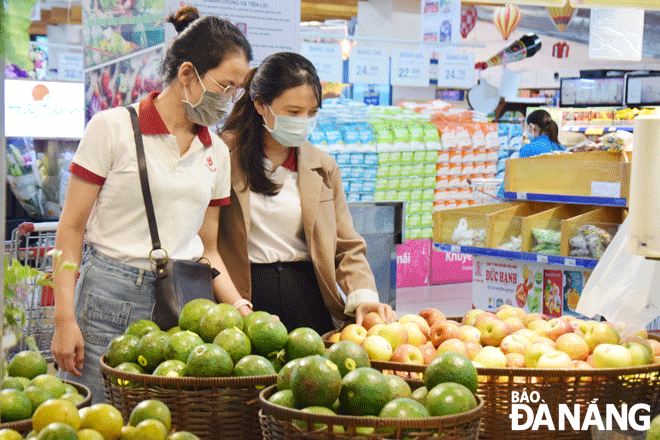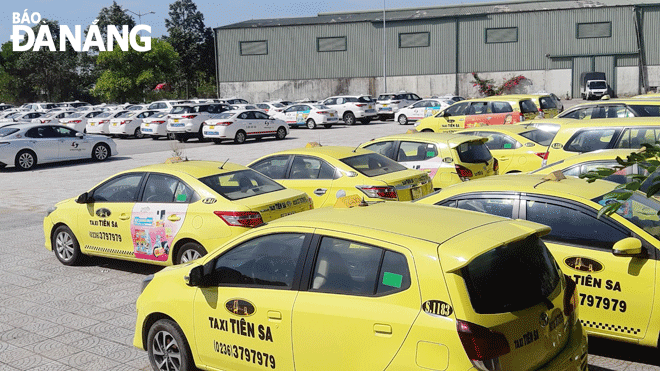Rising gasoline prices spell new trouble for consumers, businesses amid COVID-19 times
After five consecutive increases, the price of gasoline has now reached nearly 25,000 VND / liter, thus driving many manufacturing and transportation enterprises nationwide, including those in Da Nang, into a difficult situation. With the pressure triggered by high freight rates, it is inevitable that many consumer goods are going up in prices, especially in the context of production and business recovery and strong demand at the end of the year.
 |
| Due to the impact of rising gasoline and oil prices, the costs of some consumer goods have tended to go up. Customers are observed buying goods at Co.opmart Da Nang supermarket. Photo: QUYNH TRANG |
The prices of some consumer items go up
Recently recorded at markets and grocery stores, there was a hike in the prices of so many commonly-consumed items including instant noodles, glutinous rice, cooking oil, pork, chicken, carrots and potatoes.
According to traders touting for businesses at the Con Market, one of the largest of its kind, the prices of some items in the spice and dry food industry have increased. This is a group of goods strongly affected by souring domestic gasoline prices.
Le Thi Huong, the owner of Xuong Huong rice agent located in Son Tra District said that the price of rice of all kinds is stable, but the increase in freight rates has caused the cost of sales to climb by VND1,000 /10 kg of rice.
Meanwhile, representatives of supermarkets said that because supermarkets often sign contracts on goods supplies from the beginning of the year or the beginning of the quarter, the temporary increase in gasoline prices does not them.
However, due to the increase in the price of input materials and many factory costs directly affecting the manufacturing enterprises, the prices of some items on display for sale at supermarkets have started to go up.
According to a representative from the Da Nang branch of Acecook Viet Nam Joint Stock Company, the rising cost of gasoline will put great pressure on consumer spending and impose a financial burden on businesses, especially amid resuming business after the long period of social distancing sparked by COVID-19. The company has, however, still kept prices stable in a move to share difficulties with consumers in the context of people's incomes plummeting.
Transport enterprises fall into ‘dilemma’
Not only the food industry feels the ‘heat’ of soaring raw material prices, but transport enterprises are also in the same plight because they have not been able to recover from the wave of COVID-19 but have to face the double impact of increasing gasoline and oil prices.
According to Pham The Vy, the Director of Da Nang Taxi Company, after many months of hiatus due to the pandemic, this transport unit has just resumed its operation but it is being troubled by soaring gasoline and oil product prices.
In a similar trouble, Mr. Nguyen Khac Hau, the Director of Khai Hoang Trading and Transport Service Company Limited based in Thuan Phuoc Ward, Hai Chau District said that since the beginning of the year, the price of gasoline has increased continuously by more than VND 7,000 from VND17,000 to nearly VND 25,000/liter and similarly, the oil price has risen from VND12,600 to VND18,700/liter. This is a rather high increase while businesses are facing a series of pressures sparked by the coronavirus surge.
According to calculations, in the cost structure of production activities of goods and services for road transport, gasoline and oil products account for a large proportion, from 30 - 40%. Therefore, with a rise of more than VND7,000 from the start of this year, businesses have to recalculate freight rates. However, this is not easy because many contracts with their partners have been signed before.
In fact, like freight transport which is being carried out at moderate level, passenger transport activities are almost ‘frozen’. Intra-city public bus and tourist transport have not shown signs of improvement.
The leader of Vu Xuyen Tourism - Service Co., Ltd based in Son Tra District said that, over the past year, 30 passenger cars of more than 45 seats owned by his business have been almost stationary, while it must cover other expenses on parking, road use fees, and bank loan interests. Along with that, thousands of passenger coaches are now covered with tarpaulins waiting at stations and vacant land plots across the district.
Over the past several months, two vacant land plots near Thuan Phuoc Bridge have been fully occupied by a large number of 40 - 45-seat passenger cars amid the ‘hiatus’ of transport operations triggered nby COVID-19. In a similar vein, four large parking sites on spacious Vo Van Kiet Route in Son Tra District are also packed with large passenger vehicles.
 |
| The impact of the COVID-19 and rising gasoline and oil prices have made the operation of many transport enterprises fall into troubles. (Photo taken on Vo Van Kiet Street in November 2021 by THANH LAN |
Exporters get stuck in more financial difficulties
Many enterprises in the export sector said that they are always sensitive to the rise and fall of gasoline and oil prices. In fact, the prices of gasoline and oil products directly affect the cost of production and transportation of goods.
Mr. Nguyen Van Chin, the Director of Bac Dau Company Limited based in the Da Nang Fisheries Service Industrial Zone, Son Tra District, said that transportation costs account for more than 5% of the company's total operating costs. Therefore, gasoline price spike, inevitably, usually lead to a rise in the company’s operating cost.
According to Mr. Tran Van Linh, the General Director of Son Tra District-headquartered Thuan Phuoc Seafood and Trading Corporation, the recent increase in gasoline prices has greatly affected export businesses with weak competitiveness in the international market, especially those which are labour –intensive. The most obvious impact of the increase in gasoline prices is the spike in the transportation costs.
Particularly for enterprises operating in the field of seafood production and procession, input materials mainly depend on offshore fishing. If gasoline and oil prices climb up, the cost of input materials will go up. What is necessary now is how to “energize’ businesses so that they can quickly restore production and business activities, not bear the additional costs brought by soaring gasoline and oil prices.
Reporting by THANH LAN, KHANH HOA, QUANG TRANG – Translating by A. THU